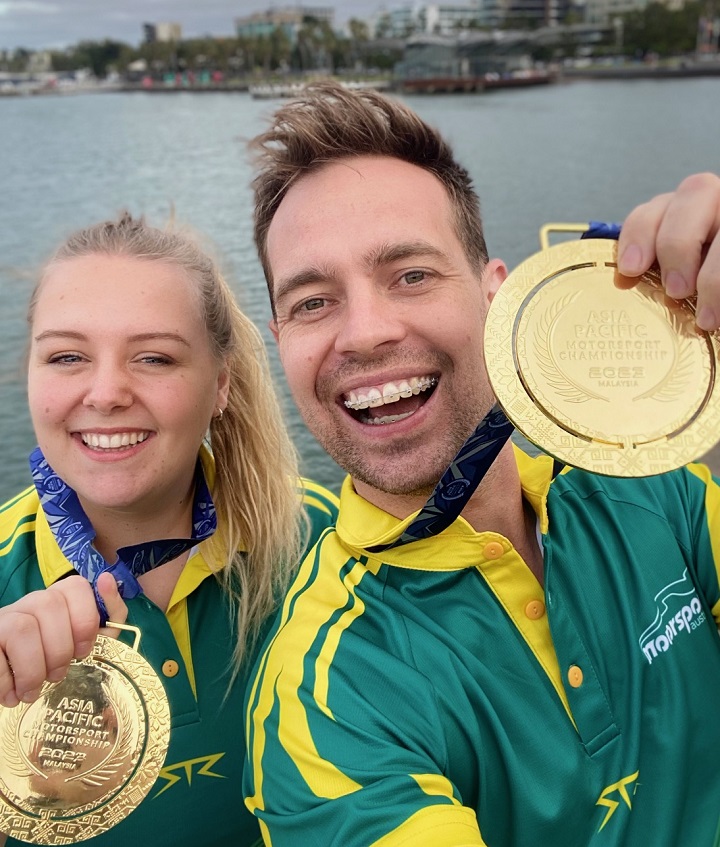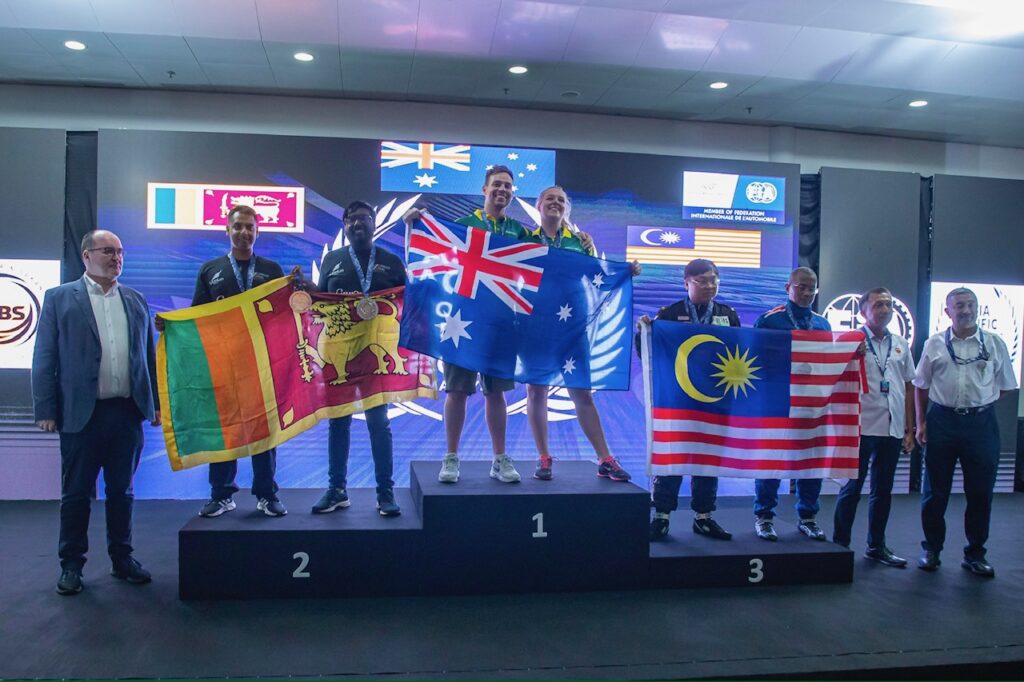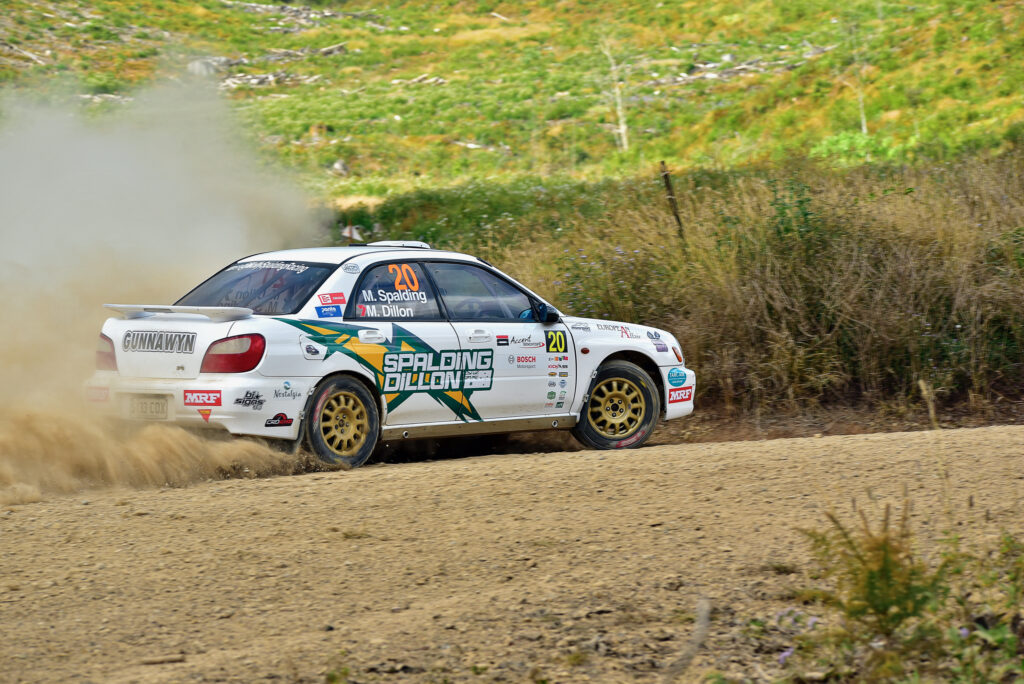“I have a much better perspective of life and its hurdles” – Champion rally co-driver Matt Dillon’s story

My diagnosis was at the start of 2020, but it came after some very stressful years running a small business. I was dealing with crazy pain and symptoms that I now know are flares. I didn’t really understand what was happening and I was just trying to push through it. I started seeing GPs, and a couple of times I went to the hospital emergency department. I was always sent away – being told I had food poisoning, that I was really dehydrated or that I had a stomach bug, and I would be given antibiotics. I must mention that I had a GP who put me on a detox of diluted apple juice for an entire week to clear my gut out. All the usual stories you hear from people living with IBD – but the whole period was a whirlwind, which caused me to lose trust in doctors.
In 2019, blood started showing up in my stools. That was the big sign that something was wrong. I was panicking and thinking – “oh my god, it’s bowel cancer.” One of my good friends Dr Katy McFadyen is a GP in Scotland, and I sent her a message that included a few photos. I remember thinking, “I can’t believe I’m sending this, it’s gross” – which reflects the stigmas and barriers around this disease. She was the first person to mention the possibility that I might have IBD. She suggested that I see a local doctor. At the time, I didn’t really have a regular doctor, but my wife had a great GP that I was able to see. Because I was armed with the right questions, the GP was able to refer me to an amazing gastroenterologist, Neel at Geelong Gastroentorology, rather than fobbing it off like everyone else had.
A calprotectin test followed by an MRI revealed that I had significant inflammation in my bowels. In January 2020, just after my 31st Birthday, I had my first scopes, and Neel was able to confirm with biopsies a diagnosis of Crohn’s disease, particularly in my terminal ileum. From the amount of scarring in my bowels, the GI suggested I have had then-undiagnosed Crohn’s disease for a long time. He sent me home with paperwork to read through and shared the CCA website to help me get a better understanding of what I’d been diagnosed with. When we started talking about symptoms – I started to reflect and realise that the signs and symptoms were always there, right back to primary school. It could’ve been undiagnosed for well over 20 years.
I think it’s the unfortunate part of this disease – that so much damage can be done when left untreated and without proper diagnosis. I’ve been in the hospital department screaming and crying in pain – in a proper flare – and turned away, being told that it was appendicitis or dehydration.
What followed were monumental amounts of blood tests, a trial-and-error process of traditional oral medications, more MRI’s and more scopes. I ‘failed’ most of the traditional medicines, with side effects that left me as a shell of my formal self. Thankfully my GI had a good understanding of alternative treatment options, and quickly moved me onto biologic medication. Within months of starting Stelara, I was in remission and have been ever since. I’m hoping to keep it that way.
Following the diagnosis, I remember walking back to my car and being told I had an incurable disease.
I had to figure out what Crohn’s Disease was. It was just before the pandemic, and being on steroids, I was told to wear a mask and protect myself from getting sick. I let my teammates know that my immune system had been knocked out, and that I was going to take it easier. Then March rolled around, and everyone was wearing masks. It made that transition easier.
Once lockdowns kicked in, I couldn’t really go out and talk to people. I found support through IBD-related social media groups, where I could talk to other people who understood the symptoms, stigmas and challenges that come with this diagnosis. Fortunately, my wife is my best friend, so speaking to her was very easy. She’s been my biggest support. She immediately joined all of these groups so she could also gather a strong understanding of what we were dealing with. My family and friends have also been very supportive, but I’m sure that many of them don’t grasp what Crohn’s Disease is other than a ‘stomach ache’. They think I need to run to the toilet a lot — the usual confusion between IBD and IBS. Then there’s the few who think I just need to change my diet.
When I joined these groups, I learned that I had a few Facebook friends who were also living with IBD. I messaged a friend of a friend, who has Crohn’s disease along with her dad, and she was immensely helpful, especially in the months following my diagnosis. She’d give me a heads up regarding her experience with different treatment options as well as potential side effects. I’ve since met dozens and dozens of people living with IBD – including in my sport. Upon reflection, I’m able to recognise how helpful it was to have that strong support network.
As a motorsports rally co-driver, having Crohn’s disease is a relevant factor in my preparation.
I started competing about 10 years ago. Rallying takes you to remote locations, generally out in the forest, which is not really the ideal location for public bathrooms. You can be on the road for 4-5 days straight, and in the car for up to 12 hours every day. There’s perhaps the misconception that IBD is the same as IBS, and that everyone with this disease is constantly running to and from the toilet. That’s not necessarily the case with me. Rather, the biggest challenge I face is fatigue.
You can’t pick and choose when fatigue turns up. You can do everything you can, and prepare as well as possible, but some days you wake up and it just hits you. I think that’s my biggest hurdle. Every now and then, if my hydration isn’t correct, I get cramps and irritation in my bowels.
The best way I can prepare for this is through exercise and fitness. That’s paramount. During the pandemic I hired a 1 on 1 PT that I’ve been working with for 4-5 years now. I was straight up with them about my health problems. As a result, he set up a program that built up my strength and fitness, in a way that was suitable for me and my health needs.
When it comes to events, having a good team around me is a huge support. They know when to give me space. The food is prepped for the entire group, and they know what I can’t eat. When they book accommodation, they always check the toilets and favour places with multiple bathrooms.
I couldn’t complete at this level, and achieve what I’ve achieved, without my team.



Last year, I was selected to compete for Australia in the Asia-Pacific Motorsport championship. This involved going to Malaysia.
I was a bit nervous about diet and toilet arrangements, so I reached out to CCA ambassador and surfer Brittani Nicholl. She provided me with great advice around fueling my body with the right foods, keeping a strict sleep routine and supporting my hydration with Hydralite. With that advice, my teammate Molly Spalding & I brought home two gold medals and a silver for Australia. It’s been one of the biggest achievement of my career, and one that could only happen with support from my GP, my gastroenterologist, my wife and my teammates
I remember taking my gold medal to my GP and gastroenterologist, as a way of saying thank you. It’s been a long journey to get to this level of competing, and they were a significant part of my journey. I wanted to acknowledge their work, and the impact that they’ve had on me.
Regarding advice for others, finding the right medical care is so important.
I feel like I’ve lucked out with my gastro and GP, but seeking doctors who are right for you is critical. Having that care has given me a massive amount of confidence. It makes me feel like I’m not on my own – I can lean on those guys.
I also think being open with people, as much as possible, about what you’re going through can be very helpful. The more that your friends, family, peers and colleagues understand what you’re going through, the more support you’re likely to receive. If you just say that you have Crohn’s Disease, they won’t know what it is.
The biggest thing for me is reminding myself that Crohn’s Disease isn’t an excuse for anything. Rather, it’s a reason to approach things differently. My mentality around Crohn’s Disease is that I treat it as a competitor. I won’t always beat it – there might be days when it’s ahead – but that doesn’t mean I give in. You can’t let it control you.
That doesn’t mean grit and push through symptoms. Sometimes you need to have down time and to rest and recover.
I’m currently recovering from a fractured spine from a crash that occurred during the Australian Rally Championship in June 2024.
I remember being in the ambulance at the scene of the crash, and the paramedic asked me what my pain was like out of ten. I remember saying that if 10 was being undiagnosed while waiting at ED in a flare, or the pain that comes with severe constipation and scarred bowels, then the pain of the broken back doesn’t even register. That’s proper pain, which is so often unseen with this disease.
Through this disease, I have a much better perspective of life and its hurdles, and how to manage my health to reach my goals. This perspective has allowed me to focus on recoveries, and to balance life a lot better.
In terms of what’s next for me, I am doing everything I can to succeed in my sport at world championship level. It’s a long road, and one that will take a lot of strategic management. I’m currently competing in the Australian Championship with female junior driver Molly Spalding. We’re positioning ourselves to be selected to represent Australian once again at next year’s Asia Pacific Motorsport Championship, and are working hard to back up our success from last year.
As for my Crohn’s Disease, it’s everyday as it comes.